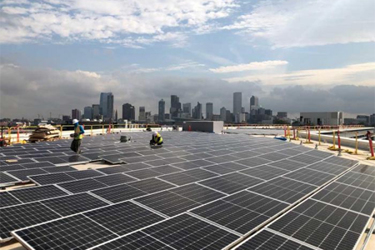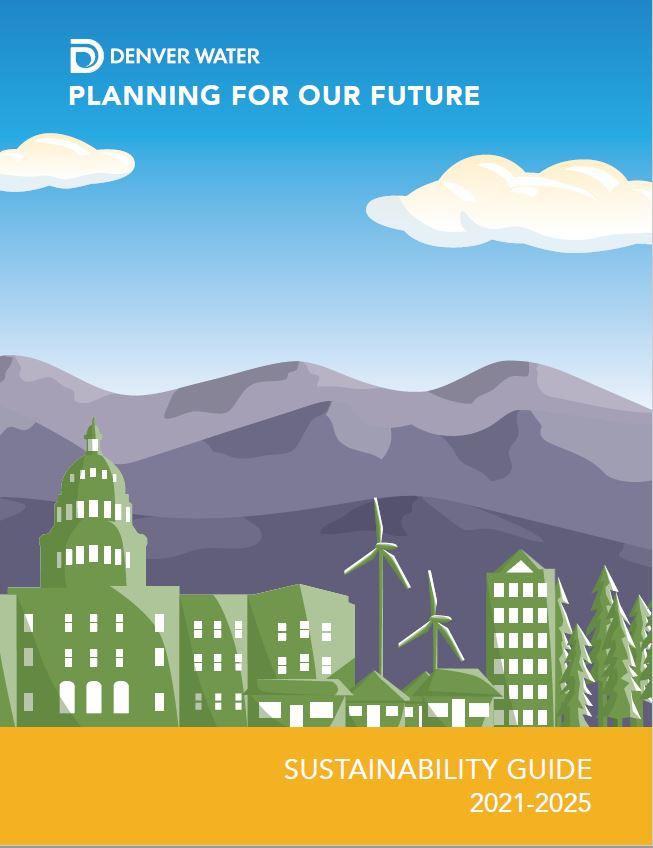Denver Water Launches New Round Of Goals To Reduce Its Environmental Footprint
By Todd Harman

Over the past three years, Denver Water set some important goals to improve the environmental sustainability of its work.
The utility, which provides drinking water to 1.5 million people across the Denver metro area every day, sought to generate more renewable energy, increase recycling and composting of waste and better track its use of water and energy. The goal was to more accurately measure efforts around efficiencies and reductions.
From 2018 through 2020, through a lot of dedicated effort, Denver Water met most of its targets.
Now, the utility has laid out a new set of ambitious environmental goals in its updated Sustainability Guide. The new guide summarizes both what was accomplished over the past three years and what it seeks to achieve from 2021 through 2025.

Denver Water has issued the first update to its Sustainability Guide, stretching the utility’s goals after meeting most of the targets set in 2018 in the initial guide. Image credit: Denver Water
There will be no resting on any laurels.
Denver Water’s new round of goals includes:
- Reduce greenhouse gas emissions across the organization by 50% from a 2015 baseline.
- Increase Denver Water’s capacity to generate renewable electricity by 1 megawatt.
- Cut waste that goes to landfills by 25% from a 2020 baseline. Reduce electronic waste by the same measure.
- Optimize water used for irrigation at Denver Water facilities by ensuring they meet LEED standards for low-water use.
The guide also lays out methods the utility will use to meet these goals.
In the area of energy, for example, it includes installation of common-sense devices like room-occupancy sensors and LED lighting during new construction and renovation projects. It also goes big, with plans to offset at least half of the utility’s energy use with renewable energy sources, with an emphasis on on-site generation.
“Our updated Sustainability Guide not only sets out objectives, but we include many of the steps we’re going to take to get there,” said Kate Taft, Denver Water’s sustainability manager. “Reducing our impact on the environment is a value that is embedded into our culture at Denver Water. Sustainability is an organizational priority, and this guide reflects that fact.”
As in the previous guide, the goals are packaged into six categories:
- Energy and transportation.
- Water.
- Materials.
- Land use and ecosystems.
- People.
- Infrastructure and assets.
Denver Water has long been invested in environmental stewardship. After all, the quality and quantity of the water supply is directly tied to the health of our landscapes, our atmosphere and the actions of our industries.
In more recent years, the utility has put a greater emphasis on describing and documenting these efforts, including significant efforts to track — with precision — changes in energy consumption, waste generation and stewardship of landscapes where it works.

The updated Sustainability Guide contains a historical timeline that shows Denver Water has long considered stewardship of natural resources an important component of its mission. Image credit: Denver Water
Denver Water’s efforts in this area has earned significant recognition.
In 2020, Denver Water was honored by the Colorado Department of Public Health and Environment with a “Gold” certification in the state’s Environmental Leadership Program.
Gold status is the program’s highest recognition for operations in Colorado. It’s reserved for organizations and companies that show commitment to sustainable practices and go beyond regulatory compliance through continuous improvement in waste reduction, resource conservation and energy savings.
Another key honor came midway through the three-year timeframe of the first Sustainability Guide.
In 2019, the The Climate Registry, a national nonprofit that verifies the work of major companies and governments to track — and reduce — emissions tied to climate change, elevated Denver Water to “Gold” status for the utility’s 10 consecutive years of work to quantify the emissions related to its activities.
Denver Water also took another significant leap forward in 2019 as well, when it largely completed its Operations Complex Redevelopment Project, one designed with sustainability at the forefront. That project, combined with other energy efficiency initiatives, led to Denver Water achieving net-zero energy across all of its facilities in 2020 (electricity and natural gas).
In March of this year, Denver Water announced that eight buildings involved in the redevelopment project at its 35-acre complex near downtown were awarded Platinum, Gold, and Silver levels of LEED certification. LEED, for Leadership in Energy and Environmental Design, was developed by the U.S. Green Building Council, is the most widely used green building rating system in the world and is an international symbol of excellence.
The main Administration Building, which houses most employees, earned LEED Platinum status.

Denver Water's new Administration Building received a LEED Platinum certification for its sustainable aspects. Photo credit: Denver Water
Its features include solar energy generation, a water reuse system and a radiant heating and cooling system that relies on water sent throughout the structure to help the building maintain an ideal temperature, vastly reducing dependence on natural gas for heat.
The LEED certification even included requirements that Denver Water recycle much of the debris from its old Administration Building, considered an important part of the process of transitioning into the new, dramatically more sustainable headquarters.
Completion of the redevelopment project and the LEED announcement in March aligned well with Denver Water’s launch of its second Sustainability Guide: A big step, but just one of many in store.
“Sustainability for the next 100 years,” wrote Denver Water CEO/Manager Jim Lochhead in the guide’s introduction, “will require continued reinvention, resilience and adaptability in everything we do.”

Denver Water is invested in environmental stewardship because the utility understands that the quality and volume of our water supply is tied directly to the health of our landscapes. Photo credit: Denver Water
